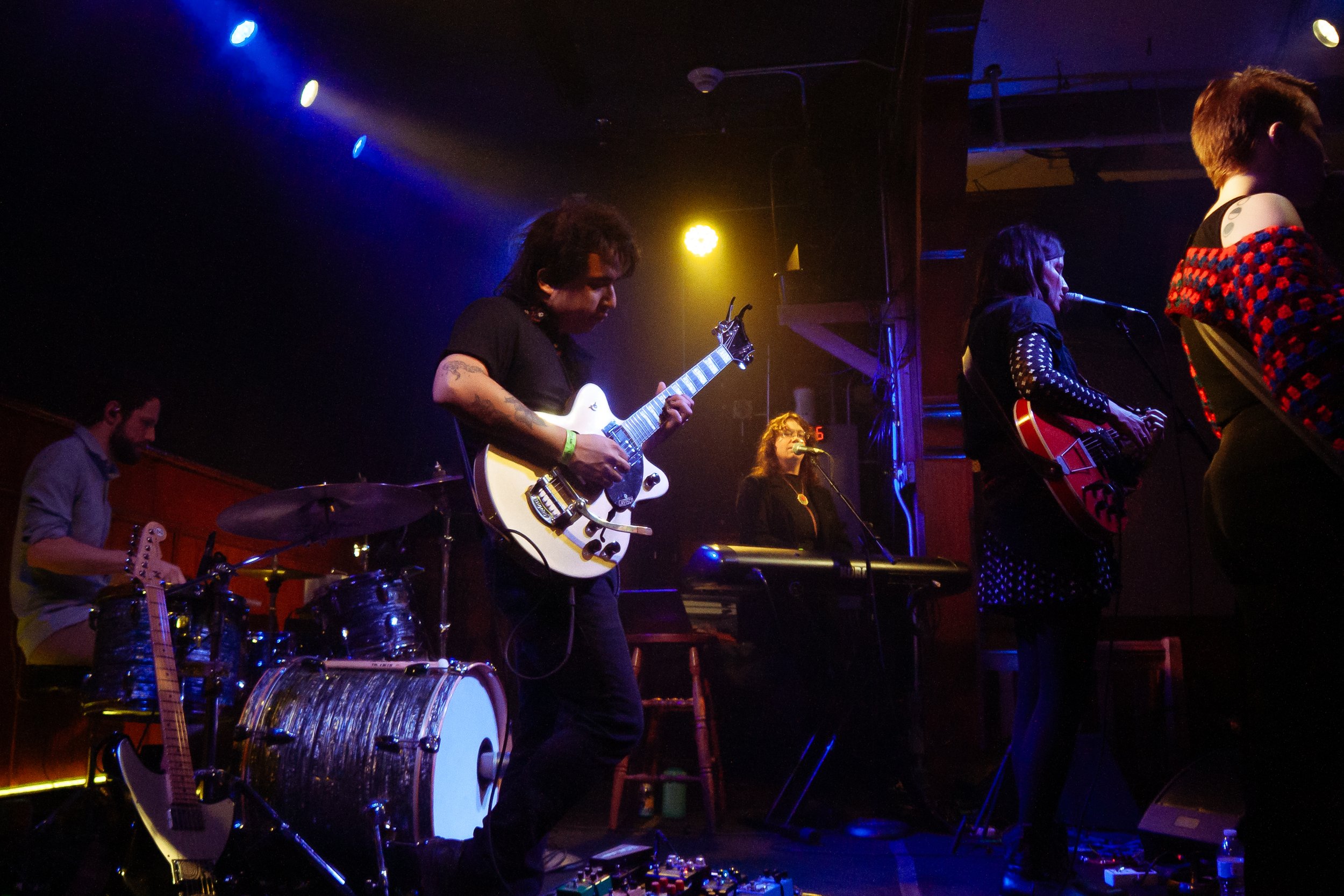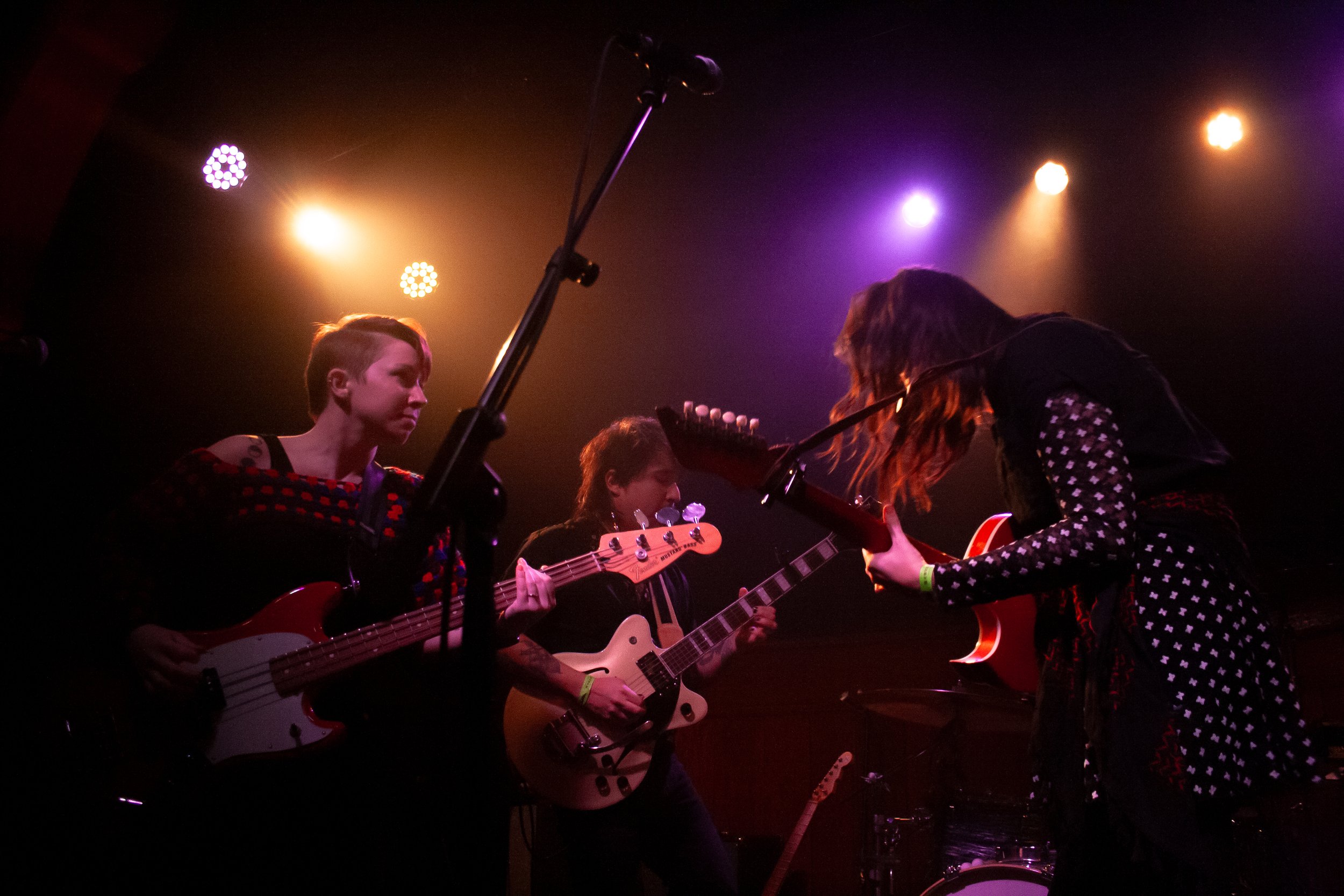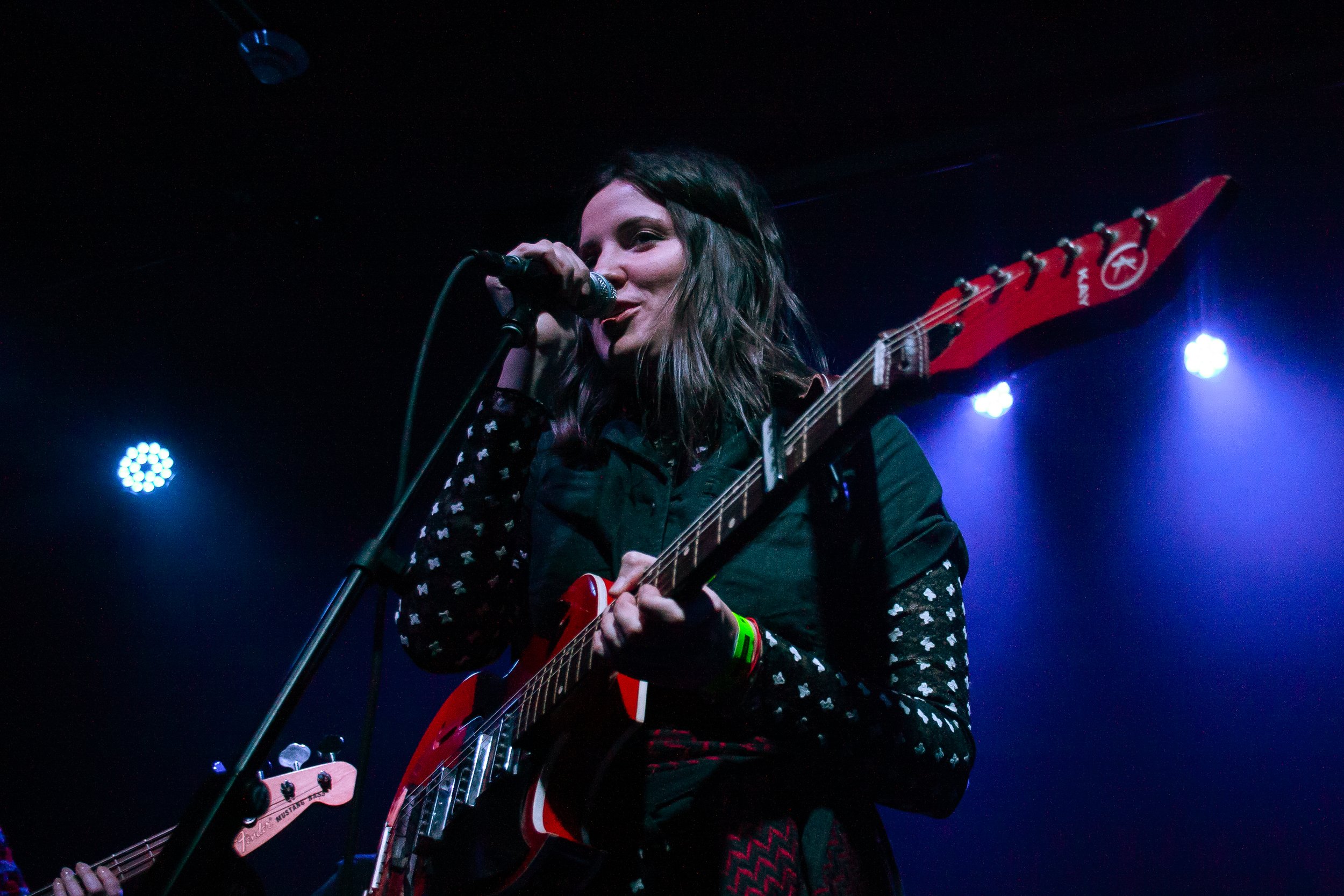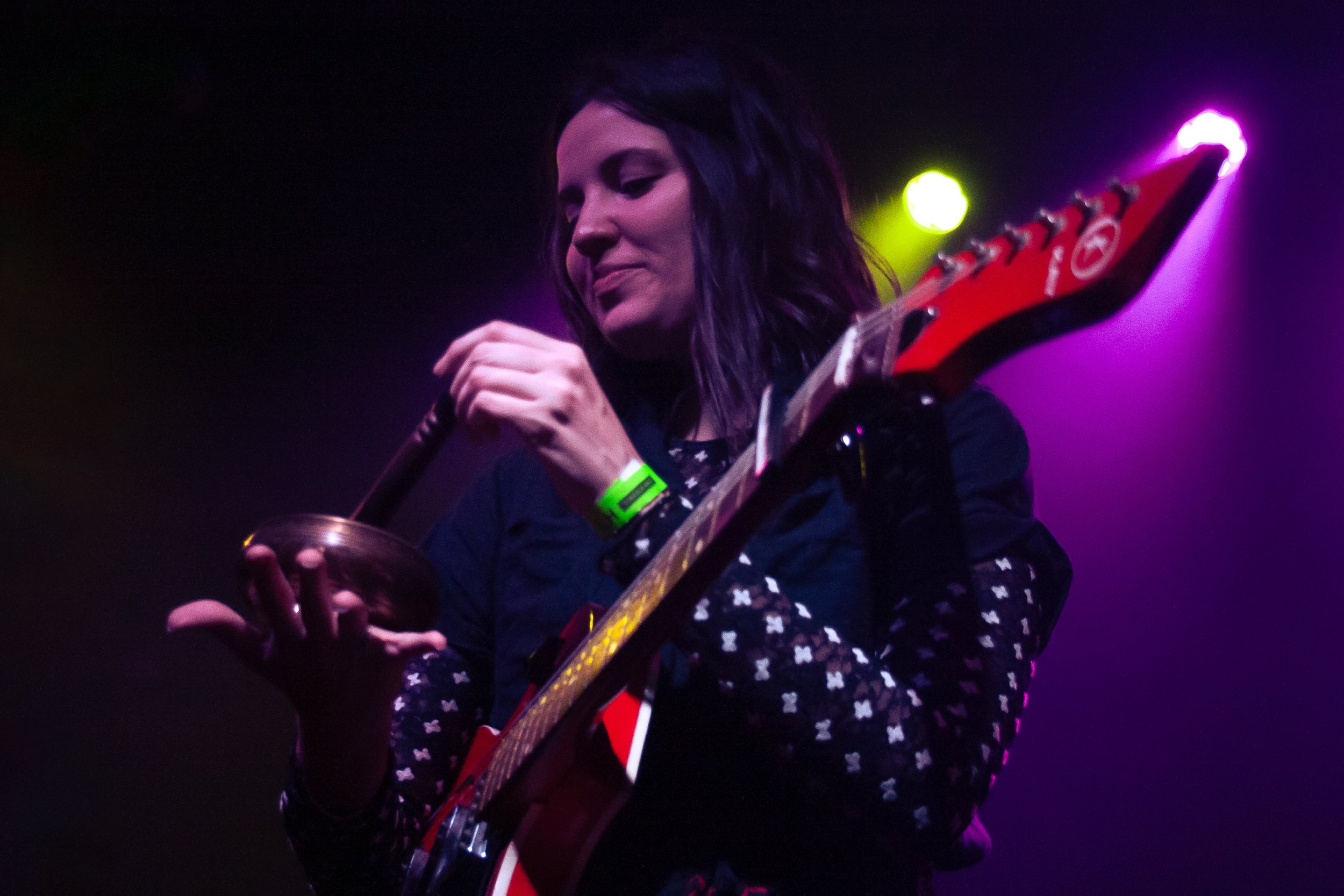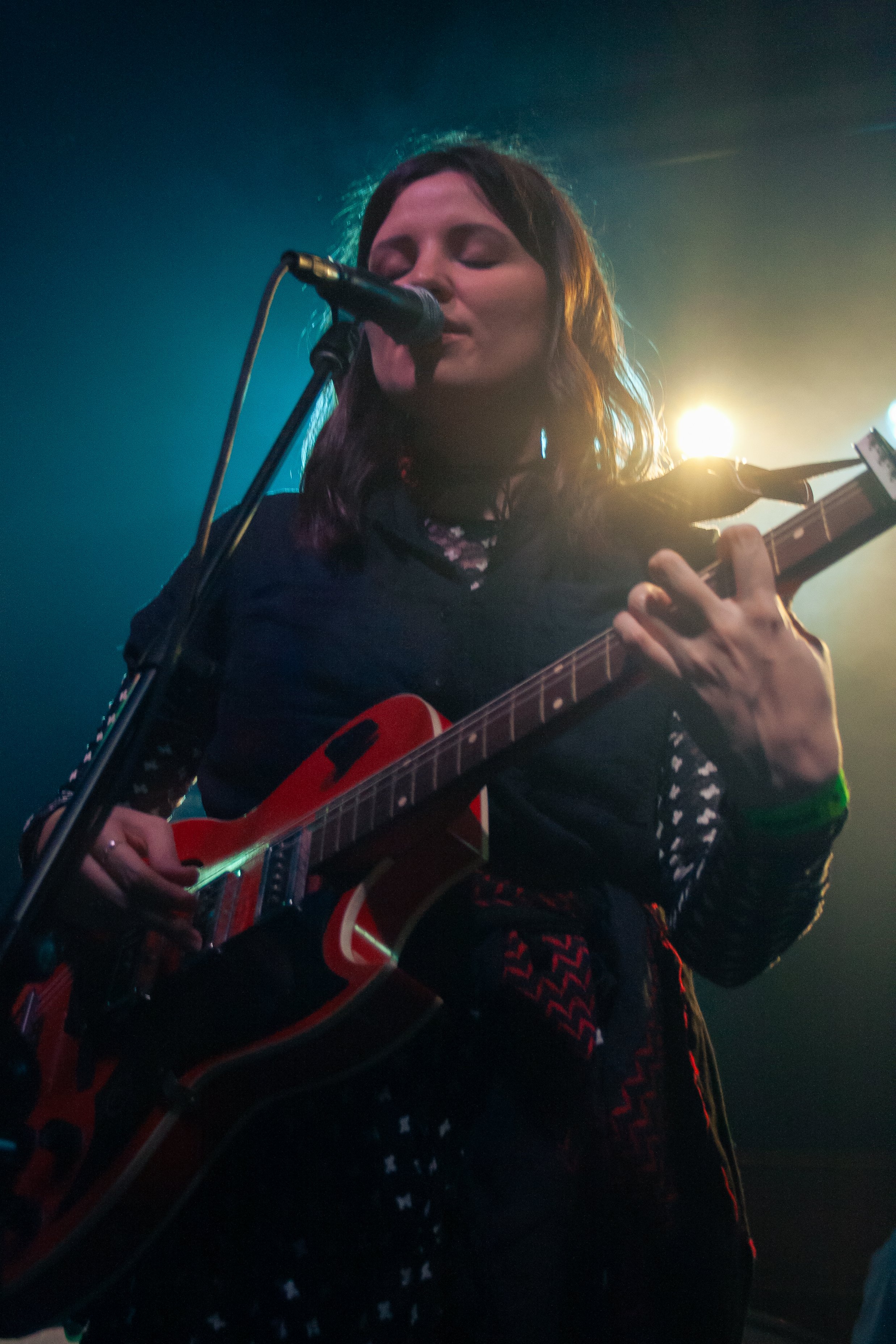Whimsy Rock is IN!: an interview with Lunar Ash.
The five-piece Chicago indie band goes deep on their creative process, musical and non-musical influences, how social organizing relates to their art, and “goofy” future projects.
Lunar Ash is a five-piece band from Chicago that originated from Ash Stewack’s initial solo project. They blend Americana, rock, folk, and other genres to create a sound that they self-describe as “whimsy rock.” As Kerry Cardoza puts it1, the ethos of Lunar Ash is “[...] to take one’s time, to move in communion with nature, to honor one’s truth, and to help others to recognize the interconnectedness of all things.” Lunar Ash released four singles in 2023 over the span of four months, and on October 4, 2023, they released their album Rosa & The Red Thread. I had the amazing opportunity to chat with Lunar Ash prior to their record release show at Schubas on January 27, 2024. Read our conversation below.
photo by Taylor Pate.
Taylor Pate: Hi! Can you guys do brief introductions?
Ash: My pronouns are they/she. I play guitar and sing.
Kenna: My pronouns are she/her. I play keys and violin, and I sing! I’m the newest member of this band.
Katie: My pronouns are she/they, and I play bass and also sing.
Evan: He/him. And I play drums and play small sample sounds.
Mark: He/they. And I play rock and roll guitar.
photo by Taylor Pate.
TP: Awesome! I just want to say I really appreciate the chance to interview you all. A belated congratulations to you guys for releasing Rosa & The Red Thread, and a proper congrats for having this record release show today. So, I just want to check in with you guys – how are you all feeling about your performance tonight?
Katie: Feel good!
Ash: Very excited!
Mark: Gonna rock ass.
Ash: We’ve been preparing for three years, so *laughter* we’re very excited to play our first show.
TP: So with that, Lunar Ash started off as Ash’s solo project around March 2020. How exactly did the band start to come together in 2022, and how has it come to be what it is now?
Mark: Ash and I were in a band a couple years back. So, during the pandemic, Ash and I kind of reconnected over our shared experiences as adoptees and started this group for adoptees to kind of trauma dump.
Ash: Process.
Mark: And to kind of just process and talk about—
Ash: To just have community.
Mark: ‘Cause it’s one of the things where you know you don’t really see that, but it’s very internal. And so, in that year, they shared with me one of the songs they were working on. And I was like, “This is good. I think you could release this now as is.” Sorta like an early Waxahatchee kind of vibe. Like an American Weekend record, or if you want, I could help bring a band together. Make it a more produced kind of thing. Not me as the producer, but I know people who will do the thing. And so, we went with that option. I cast Evan, who I’ve been in many bands with, and Katie, who I’ve played many shows with, to rock with us. And they agreed, and then we rocked. And then we wrote a record. And then we were getting ready for the show, and we're like, “We want to have more people on it.” And then we found more people in Kenna.
Ash: It’s like she’s always been here!
Kenna of Lunar Ash; photo by Taylor Pate.
TP: Additionally, you’ve said that the writing for the album began around 2016 and flourished during the pandemic. Can you speak on what exactly has influenced your writing and how it has evolved up until the release of the record?
Ash: Kind of touching on what Mark mentioned, we’re both adopted, and in 2016 I started meeting my biological family. So that was just, you know, obviously a very life-changing period. I also joined political organizing that same year, so it just felt like my worldview was radically changing. Actually, I didn’t really process any of that until 2020. Honestly, just cause I was surviving and kind of making things work. And then I had this space during the pandemic to just finally sit and reflect on how all of that has kind of changed my life. And it’s kind of been this fun connection between finding my way back to my family and then also kind of connecting, I guess, some of the struggles that’s there with the collective kind of experience.
TP: Thank you for sharing that. Understanding that, what are some major influences of your sound? Are there any particular musicians or artists that you draw inspiration from?
Ash: I think when I wrote the album or was thinking about this record in particular, I was listening to… I can not roll my r’s, but Juana Aguirre. She’s amazing; specifically, her production work was really inspirational. It’s not really musically reflective, but I think philosophically and politically, Sinéad O'Connor, or Shuhada Sadaqat, is her chosen name. Just kind of how she really brought so much of herself and brought other people with her in everything she did was really inspiring and I want to bring that in as much as I can.
Evan: I feel you had a bunch of touch points you brought. There’s Juana and then Marika Hackman and Jessica Hoop—
Ash: Yeah, Jessica Hoop’s a big one.
Evan: There were a lot of touch points that you—
Ash: Musically, Jessica Hoop is definitely up there. What about y’all?
Katie: I’d say vocally, especially for the harmonies, we took a lot of inspiration from boygenius. I know [Ash] and I especially bonded over that when we first met and started chatting. And we just love a good harmony, and they just knock it out of the park. We wanted to emulate that kind of creativity, but also solidness in their harmonies—stability.
Ash: What about you, Ev?
Evan: I don’t know. It’s kind of fun… any of the stuff I was working on the record was a fun challenge to give yourself. Ash just had so many different non-musical influences for each song that weren’t explicitly musically related. There is something about trying to translate that instead of, “I want it to sound like this person and this person.” It’s kind of like trying to tease out whatever sounds like a flock of birds taking off or, I don’t know, a red thread.
Ash: I wanted to kind of feel like a storybook instead musically. Kind of lay out some thematics in that sense.
Mark: I mean, Evan was really succinct. I think we all kind of listen to different stuff. And, you know, there is a song here where I’m like, “Oh, I’m thinking like [Lifted or The Story Is in the Soil, Keep Your Ear to the Ground] by Bright Eyes is like the vibe.” And there’s like another song where I want to have a [The Cranberries]-ish guitar part. As Evan said– it’s so much more than harnessing an artist and transmuting to yourself. We had this Google sheet of all the songs, and then there’d be some notes about tonality kind of stuff, and then there were the notes, like Evan was saying, of a vibe. You gotta be open and not necessarily play the thing that you would, maybe by default, because you’re trying to think about how you’re adding or subtracting from the end goal of the song.
Ash of Lunar Ash; photo by Taylor Pate.
TP: I just want to say I love the influence from Sinead and love the mention of The Cranberries. I love both of them deeply. With that, whimsy is a word that comes up often when describing your music. What exactly do you feel makes your music so whimsical?
*They all simultaneously point to Evan and laugh*
Ash: Everyone points to Evan! It’s so funny. Well, I think there are levels—
Mark: Layers.
Ash: Yeah.
Evan: It was whimsical long before I came along.
Ash: I think for me, the writing, I have such a kind of child-like relationship with the universe. I’m an astrologer and tarot reader. I do dream incubation. Kind of all these weird non-physical things, I feel like that’s just a way I like to tap into my creativity and engage with the world. Yeah…and then Ev is like, I don’t know. I think we’ve said before, but it feels like Evan is just kind of creating a symphony around a lot of the themes.
Evan: The themes were all there in the first place, though. It made it easy.
Ash: It really brought to life the actual atmosphere.
TP: How would you compare the feeling of releasing your four singles, “Nodal Arc,” “Tomato Cheeks,” “Lady Hawk,” and “Nested,” to releasing your record Rosa & the Red Thread back in October?
Katie: I feel the singles were really great to get out, cause they’ve helped us get a feel for what people were vibing and interested in. But I feel when the album came out, I was excited to hear what people thought of the non-singles thing. But I really appreciate it—I think each single showcases a different side of us to prepare people. And then, when they heard the whole album, they could even see how deeper we really got. I think that’s my thoughts about the singles vs. the album.
Ash: I can add to that. With “Tomato Cheeks” in particular, I guess the whimsy kind of showing up just in the zeitgeist. We launched that one on the summer solstice, and it’s about striking and workers’ rights, as well as Indigenous and land defender rights. And that summer, I guess the trend ended up being “tomato girl summer” and “hot strike summer.” That was really just like, I don’t know, it just felt affirming, I guess, that we were just on something.
Katie of Lunar Ash; photo by Taylor Pate.
TP: With that, regarding Rosa & The Red Thread, you all state, “The Rosa archetype was taught through the nurturing, supportive and revolutionary love of family, friends, comrades and community. The Red Thread is its lineage, pathways and universal will to connect and strengthen a shared sense of power, solidarity and healing.” Could you speak more on this sentiment?
Ash: I think, kind of just going back to the process of processing being an adoptee and joining a radical organization. It’s personal, I think some adoptees, and I won’t speak for all of us, [but] there has been this experience of longing and abandonment and feeling like you don’t belong anywhere.
Mark: Can confirm! *collective laughter*
Ash: It’s something that’s been very hard to balance and create relationships with. Yeah, I don’t know. It’s interesting. The more I leaned into doing collective organizing, the more I felt like that I was tending to the thing. Yeah, it’s definitely this kind of imaginative archetype that feels very—you find in a lot of revolutionary spaces and radical spaces, there’s just so many people putting their own individual stuff aside to serve this greater collective. I’m really inspired by that.
TP: On a similar note, I see that you all are outspoken about political issues. Ash, your home organization is the Chicago Alliance Against Racist and Political Repression (CAAPR), and you all expressed support for Palestine. With that, I want first to say, I truly appreciate musicians being so politically outspoken. It truly resonates as an artist who also uses their talent as an avenue for socio-political discussion. I now ask, do you feel some sort of connection between the arts and politics?
Ash: Definitely.
Mark: I think artists, and I say that in the broadest sense, when they are—if they want to engage in that kind of work, I don’t think there’s any better way to get people thinking about politics than seeing something or hearing something that moves them. Even from hearing first-hand experiences and watching stuff on the news, people get so, unfortunately, and I understand, so bogged down and jaded by it all. I think if people can engage with political discourse outside of that normal, traditional way of doing it, it really has the ability to empower movement building and change. With that said, I think it needs to be done [with] community, though. So, I think that’s kind of why it’s been important—Ash and I have had discussions about record labels and all that kind of stuff, and in the future. We want to make sure that we’re not in a place where that gets compromised by people who [we are] affiliated with or powers saying, “Hey, maybe turn that down a little bit.” Cause when there’s shit, you know there’s always shit going [on]. I think when we’re in a space where we can talk about it, it has that potential.
Ash: I guess I can add a little bit, too. I feel like artists have a lot in common, especially as workers. I’ve seen a lot of similarities in how artists are always trying to be seen and heard and are often marginalized and undervalued. I think there’s a lot of room to build solidarity with, specifically, the Palestinian liberation movement, the Black liberation movement, all these movements that are kind of fighting to be seen. I just feel as if everyone has the potential to serve the movement by building relationships with people. You don’t necessarily have to be the one on the megaphone, but just having those relationships and knowing when to pass the mic, it can make all of our futures a lot brighter.
Evan: The arts are kind of a weird thing in that, especially in America, are so widely undervalued but so accessible and important to everybody. It’s sort of this weird built-in, but there’s this component of the expectation of speaking truth to power. Artists kind of have some sort of impetus and responsibility to take on.
TP: Quick follow-up to that: for artists or people who are organizers, how would you suggest they combine the arts and organizing in an “effective” way?
Ash: Find your local organizations that are doing the work cause they’re everywhere and they’ve been doing it for decades. You don’t need to recreate or start your own thing. You really just need to commit to the struggle for the long haul. I have been pretty critical of using movement or talking about movement or revolution in artwork without having any connection to people doing the work—I think this can kind of be serving capital to extract in that way without actually building those connections. Yeah, really just building relationships, building solidarity, and showing up in a way that isn’t extractive and is really kind of bringing everybody together.
Mark and Evan of Lunar Ash on guitar and drums, respectively; photo by Taylor Pate.
TP: I want to thank you all again for your time! Just to wrap things up, do you have any new projects in the works that fans can look forward to?
Ash: Playing more shows. *Laughter*
Evan: Playing more tunes.
Katie: We’ve really just been perfecting this record for so long that there will be some stuff down the pipeline. I know we already have some demos drafted, and we wanted to dive in after the show. So, [there is] no timeline, but there will be stuff down the pipeline.
Ash: Yeah, we’re working on number two, but I think this year, we really just want to introduce ourselves cause we’re still very new.
Katie: I guess the project is just getting out there.
Mark: We also talked about doing an A Goofy Movie cover song. There’s that.
TP: Well, I’m now super excited, too. That sounds…amazing!
Ash: Thank you!
TP: Yeah! No, I was not expecting that!
*Collective laughter*
Ash: We all grew up on it!
Katie: We contain multitudes.
Ash: It’s just so fun!
TP: Yeah, so thank you! That was—ended on a high note with that one! So thank you guys for that one!
Mark: I know how to make an exit.
Listen to Rosa & The Red Thread on streaming platforms now.
Follow Lunar Ash on Instagram and check out their website.
edited by Alyssa Manthi.
photos by Taylor Pate.

